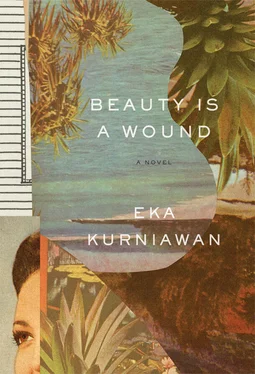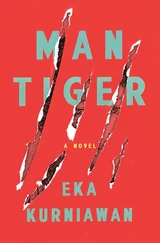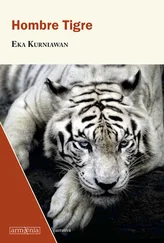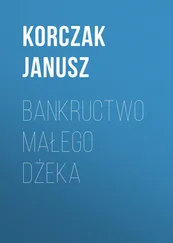Shodancho never shot at the ambarella seed, even though Ai opened her mouth as wide as she could.
Coming home to Halimunda meant returning to the source of all his fear. He tried to raise more dogs to chase away any ghosts that might approach, and this seemed to be somewhat successful in cutting down on their attacks, but a number of ghosts outsmarted the dogs by flying up onto the roof and appearing through the ceiling. Shodancho would yell and scream in his bed and Alamanda would serve the ghosts food or drink, which was all they ever seemed to want.
“Only Comrade Kliwon would ever be able to get them in line,” Shodancho complained.
“Well, too bad then that you sent him to Buru Island not long after Krisan was born,” replied Alamanda tartly.
This was true, and Shodancho deeply regretted it. Not because his wife had been furious at him for breaking his promise, because, from his point of view, he hadn’t done so: his promise to Alamanda had only been to let Comrade Kliwon live, and the man’s life had in fact been spared, and besides Shodancho was powerless to influence the commanding generals who had decided that Comrade Kliwon was one of die-hard the communists and that they all had to be exiled to Buru. Shodancho only regretted that Comrade Kliwon wasn’t there to control the communist ghosts. He needed that man and thought that he would have to somehow get him home, or else be forced into exile himself.
He chose the latter.
Reports of a military occupation in East Timor had been coming in: guerrilla fighters were giving the National Armed Forces a bit of trouble, and Shodancho enlisted. He would say sayonara to the ghosts and go to East Timor, even if it meant leaving his wife and daughter. All of the generals knew his reputation and knew that his guerrilla knowledge was precisely what was needed in the occupied regions.
Shodancho’s plans to leave soon became the topic of public conversation. At a farewell celebration at Independence Field on the day of his departure, a military marching band played. Then Shodancho traversed the city in an open jeep, dressed in full military attire, waving at all of the city folk and smiling derisively at all the restless, tortured ghosts. He and his retinue passed the city limits and gradually disappeared.
He had forgotten to say goodbye to his wife and child.
“He didn’t even take out the ambarella seed,” Ai complained.
“Trust me, he won’t last long there,” Alamanda comforted her. “He was an amazing guerrilla in Halimunda, but East Timor is not Halimunda.”
And she was right. Within six months Shodancho was sent home with a bullet lodged in his shin. It seemed the city folk would never truly be rid of him.
He complained to his wife about how hard it was to make war in that shitty place, trying to make himself feel better about his swift return. “I don’t know what they are looking for in that barren battlefield.” She tried to get him to go to the hospital to remove the bullet, but Shodancho refused. He said that it didn’t hurt anymore, just made him limp a little. He wanted it stuck there as a bitter souvenir: “Because the man who shot me aimed his rifle while singing the Internationale . It turns out those communist scoundrels are everywhere.”
After a while, Comrade Kliwon’s library had to close. A vicious rumor spread that he was poisoning the minds of schoolchildren by having them read noneducational trash, connecting this to his past activities as a legendary communist. Comrade Kliwon was enraged by that hogwash, but Adinda was able to calm him down. He finally closed the library, storing away the books and vowing that when his child grew up he would instruct him or her to read all of them, and people could see whether or not that child’s morals were destroyed.
“It’s not that I don’t want to offer them trashy noneducational books, the problem is that they already burned all the trashy noneducational books I had,” he said.
Shodancho had just opened an ice factory, using some joint capital from a shadow partner. Knowing that Comrade Kliwon was having difficulty after being forced to close his library, he proposed that the man help run this factory, practically as a full partner. Of course this was a very promising business. There were the ordinary fishermen but please note, since the collapse of the Communist Party (which meant the disbandment of the Fishermen’s Union) there were also more big ships operating in the Halimunda seas, and they all needed ice. Comrade Kliwon was not at all interested in that proposal. He didn’t state his reasons — maybe they were ideological, or maybe he felt uncomfortable taking any more help from Shodancho and his wife after the morning of his scheduled execution — but chose to become a bird’s nest hunter instead. The nests could be sold at very high prices to Chinese merchants, who then would resell them in big cities and abroad. Comrade Kliwon didn’t care who was going to eat the bird’s nests, which according to him tasted no more delicious than plain macaroni — it was said the nests were made from the birds’ saliva, but Comrade Kliwon couldn’t have cared less if the nests were made from their shit — all he thought about was getting the things and selling them to the Chinese middlemen, and he joined a hunting team of four new friends.
There were walls of steep cliffs all along the jungle on the cape, and in those cliffs there were caves, big and small, high and low, the lowest ones visible only when the tide went out, and there in those caves the pretty black birds made their nests, coming in and out of the mouths of the caves, swooping across the foaming waves.
The team usually went out at night, armed with cages, a little bit of food, flashlights, and emergency antivenom medicine, because the birds shared their caves with serpents. The four men approached the cliffs silently, on a rowboat without a motor. They had to be very patient navigating the fickle waves that sometimes cooperated and sometimes closed off the mouths of the caves, and they had to constantly be on the lookout for the turning tide that could come rushing in without warning, trapping them inside a cavern. Sometimes they would drop an anchor at a jutting reef, take out their safety ropes and climb up the cliff, risking their lives to reach the higher caves. This work was incredibly exhausting, and sometimes they’d be kept waiting for days by unforgiving weather. But the hunts’ earnings made the four of them quite prosperous. The money was way better than what Comrade Kliwon could get in the fields and rice paddies or from the library.
And he led his life as a nest hunter for about a month, while Adinda waited for him anxiously back at home, with the little newborn Krisan, but then one night one of the men slipped and fell, sliding down a cliff and slamming into a coral reef. He died instantly, not needing any help or even a hospital. They had already gathered lots of swallow nests that night, which suddenly all seemed worthless because they were also bringing home their friend’s corpse. Everything they earned from selling those nests was given to the dead man’s family, and then Comrade Kliwon and his two other friends stopped their hunting. Of course there would be other hunters, and other dead men, because the birds would keep on making their nests, but Comrade Kliwon had decided to forget that frightening business — he realized that if he died, he would leave behind a wife and a newborn child. He didn’t want to do that.
He wracked his brains looking for a way to break into another business. By that time, Halimunda had become a beach resort. In truth the city had been a favored location since the colonial era because of the two beautiful bays formed by the jungle cape, but in the early years of the new government the city started promoting itself as a beach resort. There were new hotels tucked into a number of side streets, and new souvenir kiosks. Simple food stalls had turned into seafood restaurants, and the ruts in the road had been patched with new asphalt. The tourists arrived from every far-flung place, both domestic and abroad, and most of them came to swim at that beautiful beach. The western bay was their favorite spot, while the eastern bay became the port and the fish market. Comrade Kliwon thought hard about what the tourists who came to swim most needed, and tried to combine that with what he might be able to do. He found his answer.
Читать дальше











